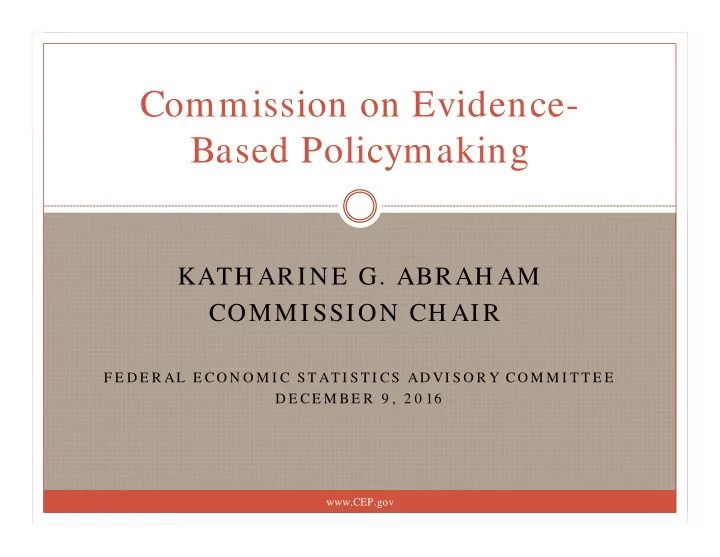

Commission on Evidence- Based Policymaking KATH ARINE G. ABRAH AM COMMISSION CH AIR F E D E R AL E CO N O M I C S T AT I S T I CS AD VI S O R Y CO M M I T T E E D E CE M BE R 9 , 2 0 16 www.CEP.gov
What is the Commission? The Commission is the result of discussions between Congress and the Executive Branch on opportunities for improving how the government uses survey and administrative data Particular interest in the use of administrative data to produce more robust statistics and support program evaluation Created by bipartisan legislation co-sponsored by Speaker Paul Ryan and Senator Patty Murray, enacted March 30, 2016 (P.L. 114-140) www.CEP.gov
Who are the Commissioners? 15-member bipartisan commission: Researchers and Adm inistrators Privacy Experts Katharine Abraham Allison Orris Paul Ohm President University of Maryland OMB Georgetow n University (CHAIR) Ron Haskins Speaker of Bruce Meyer Robert Hahn Brookings Institution the House University of Chicago University of Oxford (CO-CHAIR) Hilary Hoynes Sherry Glied Latanya Sweeney House Minority University of California, Leader New York University Harvard University Berkeley Kenneth Troske Robert Shea Kathleen Rice Senate Majority Leader University of Kentucky Grant Thornton LLP Faerge Baker Daniels LLP Jeffrey Liebm an Kim Wallin Robert Groves Senate Minority Harvard University Wallin Ltd. Georgetow n University Leader www.CEP.gov
What is the Commission working on? Major focus on uses of data to produce relevant evidence about Federal programs Data lifecycle model a framework for thinking about current practice and potential future models Data acquisition Data curation Data linkage Data access/ analysis Data archiving/ destruction Also charged to make recommendations about how to institutionalize robust evaluation in ongoing program operations www.CEP.gov
Privacy considerations central to our work 5 of the 15 Commissioners were appointed based on expertise in “protecting personally-identifiable information and data minimization” The Commission’s September 9 meeting was devoted to key considerations about privacy related to evidence-building Privacy considerations will continue to play a substantial role as the Commission formulates findings and recommendations www.CEP.gov
What are we hearing: Existing Federal models Will discuss Federal models at December 12 meeting Data acquisition, curation and linkage BLS QCEW program Center for Administrative Records Research and Applications Longitudinal Employer-Household Dynamics program Data access/ analysis Statistics of Income Joint Statistical Research Program Federal Statistical Research Data Center network CMS Virtual Research Data Center NCES Data Licensing System Data access models differ in several respects Implementation of privacy and confidentiality safeguards Criteria and process for research project approval Approaches to funding necessary infrastructure www.CEP.gov
What are we hearing: International models Working to understand how other countries tackle these issues; will explore this more at our January 13 meeting. Four aspects of approach to data access that appear to be common across several countries: Centralized, but shared, governance: Centralized approval of research applications by board that include lay members Privacy Principles – Five Safes: Safe people, safe project, safe setting, safe data, safe outputs Distributed Access: Virtualized access, walled off analysis Cost Recovery: User fees fund access models www.CEP.gov
What is the role of evaluation in the Commission’s work? Important for the Commission to understand the needs of the evaluation community Evaluators both inside and outside of government play a central role in generating relevant and rigorous evidence The Commission’s November 4 meeting focused on issues of concern to evaluators Nine witnesses described key capacity challenges and opportunities, including those related to collecting and accessing data for evaluation Numerous other evaluation associations, advocates, and contractors have contacted the Commission to provide suggestions and advice www.CEP.gov
What are we hearing: RFC CEP published a Request for Comments in September; will remain open thru December 14. More than 220 comments received thus far Major themes we’re hearing from the public Nearly 150 comments related to privacy concerns with collecting and using specific data. Many are related to the student unit record ban or objecting to government collection of data More than 70 comments include detailed suggestions about improving access to microdata for research purposes, with extensive focus on strategies for preserving privacy and confidentiality Multiple commenters have offered specific models of linkage, access, or data security Multiple commenters have encouraged integrating program evaluation in the design of Federal programs, with many encouraging the Commission to promote a range of methods in final recommendations www.CEP.gov
What is the Commission’s timeline? CEP Meetings, Hearings, Com m ission Final Report Enacted Research & Deliberations Ends March September 2017 Sept. 30, 2017 July 2016-August 2017 2016 Requires approval of Past Events 12 Com m issioners • Meeting # 1, July 20 16 – Introduction • Meeting # 2, Sept. 20 16 – Privacy Considerations • Public Hearing, Oct. 20 16 – Washington, DC • Meeting # 3, Nov. 20 16 – Key Issues Related to Evaluation Upcoming Events • Meeting # 4, Dec 12, 20 16 – Federal Models • Public Hearing, Jan. 5, 20 17 – Chicago, IL • Meeting # 5, Jan 13, 20 17 – State and International Models • Public Hearing, Feb 9, 20 17 – San Francisco, CA www.CEP.gov
How can you participate? Submit Written Com m ents : Request for Comments posted in Federal Register on Sept. 14 available at regulations.gov under Docket ID USBC-2016-0003 until Dec. 14, 2016. Attend a Meeting of the Commission Next meetings scheduled for Dec. 12 and Jan. 13 in Washington, DC Check CEP.gov for notices regarding in-person and remote attendance Attend a Public Hearing Next hearing scheduled for January 5 in Chicago Third hearing scheduled for February 9 in San Francisco Check CEP.gov for notices regarding attendance options Join the Commission em ail list for future updates: events@cep.gov www.CEP.gov
Recommend
More recommend